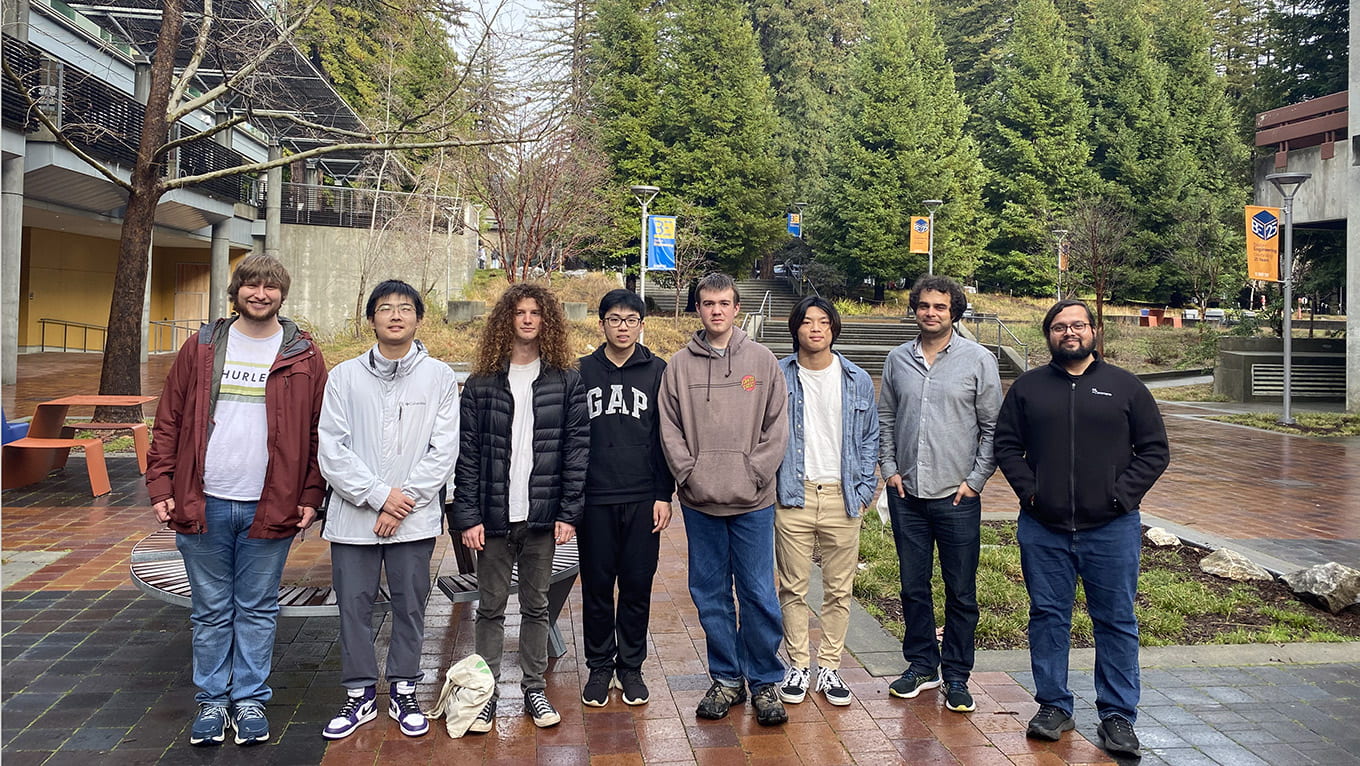A team of six UC Santa Cruz Baskin School of Engineering undergraduate students, mentored by Assistant Professor Scott Beamer and graduate student Nilesh Negi, are competing against 11 other teams in the third annual Winter Classic Invitational, a virtual cluster (supercomputing) competition for students from Historically Black Colleges and Universities (HBCUs) and Hispanic Serving Institutions (HSIs). This is the second time UCSC is competing in the Winter Classic Invitational, having placed third in the 2021 inaugural event.
Supercomputing—used interchangeably with high-performance computing (HPC) or scientific computing—is the ability to process large amounts of data and solve complex computational problems at high speeds.
“Although HPC may not be as much of a buzzword as ‘machine learning’ or ‘AI,’ supercomputing draws from similar techniques and algorithms used in other forms of computing and has various applications in both industry and academia,” said Negi, team UCSC mentor and a second-year computer science and engineering master’s student.
Areas like real-time weather forecasting, molecular dynamics for drug discovery, large-scale machine learning such as ChatGPT, and computer-generated graphics are just a few of the latest supercomputing applications.
When Negi, who has several years of scientific computing industry experience, first joined Baskin Engineering, he was surprised to find there was not a community yet formed of engineering students interested in supercomputing. To get more students involved in the field, he teamed up with Beamer, an assistant professor of computer science and engineering at UCSC, to bring supercomputing opportunities to campus.
Organized by Intersect360 Research, an HPC industry analyst firm, the Winter Classic Invitational provides undergraduate students hands-on supercomputing experience, from building to running HPC applications.
For each week of the competition, student teams are mentored by a partner organization to learn how to use and optimize workloads on that organization’s supercomputer. Because the competition is fully remote, students only need a secure connection to access a partner organization’s state-of-the-art HPC applications.
This year’s four mentoring partner organizations are Hewlett Packard Enterprise, Oak Ridge National Laboratory, Amazon Web Services, and NASA. Each organization judges teams based on performance benchmarks and scientific visualization challenges they have determined for their supercomputing applications. Essentially, students with the highest performing systems at the end of each week will receive the most points, which will be tallied at the end of the competition to determine the winners.
Competing for Team UCSC 2023, also known as the Not-So-Slow Slugs, are computer science freshmen Aidan Au-Yeung, Alexander Beloiu, Victor Chen, JiaCheng Liu; Mark Forbush, a junior majoring in applied mathematics and minoring in bioinformatics; and Kyle Little, a senior majoring in computer science.
Although many of the team members are new to supercomputing, Negi is impressed with how fast the team is picking up concepts and learning through experimentation.
“We have a great group of enthusiastic and dedicated students,” Negi said. “They are working extremely well as a group and are definitely making the most out of this experience.”
The competition runs until mid-April. In addition to being judged on supercomputing performance, student teams will also be scored on how well they present their results at the conclusion of the competition.
Another group of Slugs is currently competing in the ISC 2023 Student Cluster Competition, an international supercomputing competition geared toward students with prior supercomputing experience.
Team UCSC is one of only two American teams selected to compete in this year’s ISC. To support the team’s efforts in the competition, the National Energy Research Scientific Computing Center (NERSC) at Lawrence Berkeley National Laboratory is providing access to their supercomputer, one of the top 10 supercomputers in the world.
Members of the ISC 2023 UCSC team include Negi, Mark Forbush and Kyle Little from the Winter Cluster UCSC team, and Jessica Dagostini, a first-year computer science and engineering Ph.D. student. They are mentored by Beamer and first-year computer science and engineering Ph.D. student Yiwei Yang, who was on one of the top teams at last year’s ISC competition.
Both UCSC supercomputing teams were formed by members of the UCSC HPC club. If you are a UCSC student interested in high-performance computing and would like to get involved in competitions and/or supercomputing-related research on campus, reach out to Nilesh Negi at nnegi@ucsc.edu.
To learn more about supercomputing at UCSC, visit the UCSC HPC Youtube channel and follow the club on Instagram and Twitter.
– SHARE THIS STORY –
You May Also Be Interested In
-

2025 Dean’s Awards highlight outstanding Baskin Engineering undergraduate research in AI, cybersecurity, biomedicine, and more
-

Baskin Engineering students sweep SC Launchpad 2025 awards in technology and social impact categories
-

First annual UC Open Summit highlights open source innovation in the UC system

